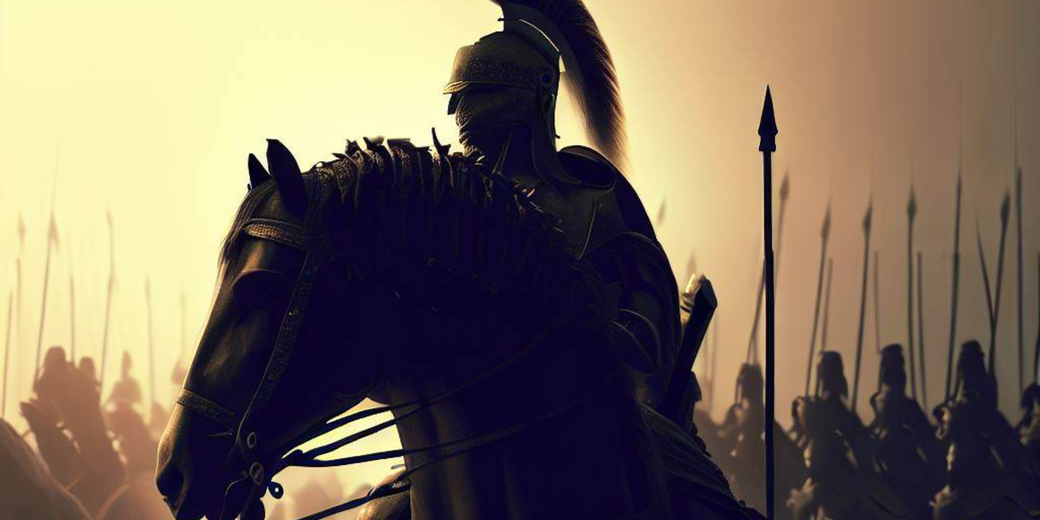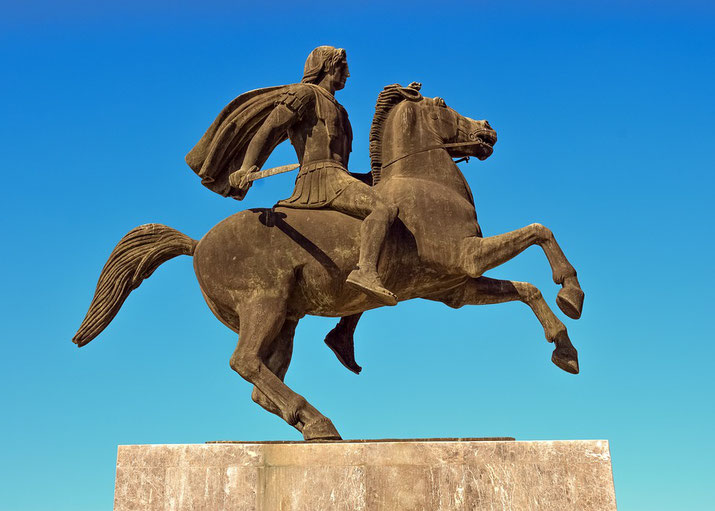Why Alexander the Great was never defeated in battle

Alexander the Great, the very name brings to mind images of battles, great conquests, and a larger-than-life image. His achievements as a military leader are well known, and his reputation has lasted for over two thousand years.
But what made Alexander such a successful leader?
From his strategic skill to his inspiring leadership and well-trained army, we will explore the reasons for his unequalled military ability, and understand why people still consider him one of the greatest military leaders ever.
Alexander's childhood
Alexander was born in 356 BC in Pella, the capital of the Macedonian kingdom, and was the son of King Philip II and Queen Olympias.
From a young age, Alexander was involved in the military culture of Macedon, as his father was an excellent military strategist who changed Macedon into a powerful state.
Queen Olympias was deeply religious and taught him to believe that he was a descendant of the gods Achilles and Zeus.
Alexander learned from some of the best tutors in the Greek world, including Aristotle, who taught him philosophy, ethics, and politics.
At eighteen, Alexander fought alongside his father at the Battle of Chaeronea, where he played an important role in defeating the Greek city-states and establishing Macedonian control.
In 336 BC, when Alexander was twenty, his father was killed, and he became King of Macedon.
He immediately faced several challenges, including rebellion by some Greek city-states and the threat of attack from the Persian Empire under King Darius III.

His drive to conquer
Alexander was not content with just protecting his kingdom; he wanted to grow it, so he began a series of military campaigns starting with the invasion of Persia in 334 BC.
Alexander's army had about 35,000 soldiers, which included Macedonian phalanxes, cavalry and archers.
They moved through Asia Minor and beat the Persians at the Battle of Granicus, a victory that gave Alexander control of western Asia Minor and allowed for further advances.
Alexander continued his campaign into Syria and Egypt, where people welcomed him as a liberator from Persian rule.
He founded the city of Alexandria in Egypt and then captured the main lands of the Persian Empire.
In 331 BC, he defeated Darius III at the Battle of Gaugamela, which historians see as the end of the Persian Empire.
Despite his many wins, Alexander was not unbeatable. He had some setbacks, including the rebellion of his troops at the Hyphasis River in India and the killing of several close friends and advisors, including his childhood friend Hephaestion.
His strategic brilliance
Alexander the Great was a military leader known for his exceptional strategic and tactical thinking.
He was skilled at adjusting to changing situations and he had a natural ability to identify his opponents' weaknesses and make use of them.
His clear strategies were key to his conquests, and one of his most important moves was the decision to attack the Persian Empire.
At the time, Persia was the strongest power in the region, and many thought that it was too strong to beat.
However, Alexander saw a chance to weaken the empire by attacking its weaker regions and cutting off its supply lines.
He launched a series of fast attacks, quickly taking land and securing his hold on the region.
His tactical nous
Alexander was also a skilled tactician, and he used his army’s better training and discipline to great effect.
He often used feints and distraction attacks to confuse his opponents, and he was not afraid to take risks when he saw a chance for victory.
In one battle, for example, Alexander led a charge against the Persian army’s centre. This action left his sides open.
As a result, his opponents took the bait, and their attack allowed Alexander to move around and defeat them.
Perhaps the most important example of Alexander’s tactical skill was his use of the phalanx.
The Macedonian phalanx was a tightly packed group of spearmen that was nearly unbeatable in close combat.
Alexander used this group to great effect, breaking through enemy lines with it and then sending his cavalry to take advantage of the opening.
He also used a range of siege machines, such as catapults and battering rams, to break through enemy walls.
How he inspired loyalty in his men
One of the most remarkable qualities of Alexander the Great was his natural ability to inspire loyalty in his soldiers.
He could win their loyalty and dedication, and this was a key factor in his military success.
Alexander’s soldiers were very loyal to him, and they were willing to follow him anywhere, even into the most dangerous battles.
He had a talent for giving inspiring speeches, and he could share his plans and goals in a way that made his soldiers want to fight for him.
In addition, he was friendly and easy to approach; he spent time with his soldiers, listening to their worries and meeting their needs.
He was known for leading his troops from the front and was not afraid to take risks and put himself in danger, so his soldiers admired his courage and were inspired to follow his example.
The high quality of his army
The Macedonian army was based on the phalanx, and it was supported by light infantry, archers and cavalry. These units gave extra movement and power on the battlefield.
Alexander spent a great deal of time and effort to ensure that his soldiers were well trained and ready for battle.
In particular, he focused strongly on discipline, and he was known for being a strict disciplinarian.
He expected the highest standards of behaviour from his soldiers, and he was not afraid to punish those who did not meet these standards.
In addition to its well-trained soldiers, Alexander’s army was also well equipped with the newest weapons and technology of its time.
Macedonian soldiers were armed with the sarissa, a long spear that allowed them to fight enemies at a distance.
Moreover, Alexander was known for his use of cavalry, which gave his army a level of movement that was better than his opponents.
Should we admire a brutal military warlord?
Although there is no denying that Alexander the Great was a skilled army leader who won amazing victories, it is important to remember that he was also a harsh and violent leader who was responsible for the deaths of thousands of people.
One of the risks of admiring military leaders like Alexander is that it may lead us to overlook or even praise their violent and harmful actions.
Furthermore, this attitude can have serious effects, as it may make us see war and conquest as good and heroic, rather than seeing the heavy cost they can have on human life and society.
Although he is often remembered as a great conqueror who brought new cultures to the lands he took over, the reality is that his conquests often led to the destruction of existing cultures and harsh treatment of conquered peoples.
What do you need help with?
Download ready-to-use digital learning resources
Copyright © History Skills 2014-2025.
Contact via email
With the exception of links to external sites, some historical sources and extracts from specific publications, all content on this website is copyrighted by History Skills. This content may not be copied, republished or redistributed without written permission from the website creator. Please use the Contact page to obtain relevant permission.





